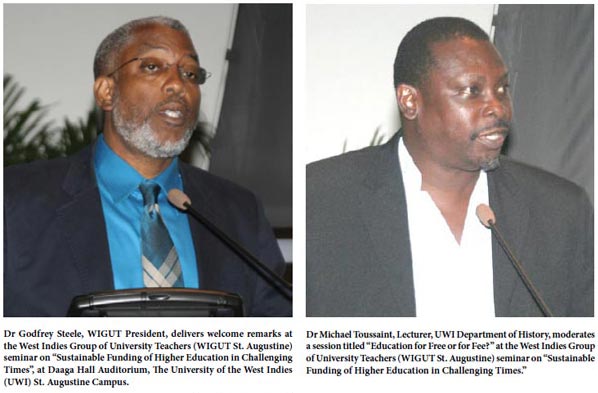|
April 2010

Issue Home >>
|
WIGUT seminar on higher education funding

Why would a university trade union such as the West Indies Group of University Teachers St Augustine hold a seminar on funding higher education? As part of its education and professional development programme, WIGUT hosted a seminar to highlight the funding challenges in higher education on March 4, 2010. According to WIGUT President, Dr Godfrey Steele, the seminar was held as a result of global, regional and national reports on the issue. These reports suggest there is a crisis in funding Higher Education (HE). The WIGUT President and Executive members decided that this seminar would be a special project to contribute positively to informed discussion and exploration of the funding issues affecting UWI and other higher education institutions.
While there may be differences of opinion on the impact of the global recession on higher education, it seems that in the Caribbean and, in particular in Trinidad and Tobago, the crisis is here, despite considerable investment and commitment by the State and other agencies. This funding crisis has the potential to affect the quality, delivery and implementation of HE programmes. The potential impact on all students, staff and stakeholders in the public and private sectors needs to be examined and discussed with specific reference to funding the academy in a time of stalled projects, expired salary agreements, shortfalls in cash, and possible delays in the receipt of monthly subventions to meet operating costs.
The seminar discussed a range of views on the crisis and explored innovative and feasible policies to protect and grow the significant investment in human resources and higher education. Several local and overseas stakeholders were invited from higher education institutions such as the COSTAAT, the University of the Southern Caribbean, the University of Trinidad and Tobago, The School of Business and Computer Science, The University of the West Indies, Cave Hill Campus, The University of the West Indies Open Campus, the University of Technology (UTECH) Jamaica, The Accreditation Council of Trinidad and Tobago. Ministers and representatives of the Ministries of Labour and Small and Micro-Enterprise Development; Science, Technology and Tertiary Education and Education, and the Chief Personnel Office and other stakeholders were invited to submit proposals for presentations.
Participants included members of the UWI St Augustine campus community such as students; academic, senior administrative and professional staff (ASAP); administrative, technical and service staff (ATSS); senior management. There were presenters and guests from other campuses and universities. The audience comprised the leadership and representatives of the labour unions at UWI (WIGUT, OWTU, EPA) and other unions. The objectives of the seminar were to:
- Collect and present information on issues in the sustainable funding of higher education
- Analyze and assess the current and potential impact of a funding crisis in higher education
- Document and present proposals for constructive and innovative funding of higher education
- Develop a draft working policy on sustainable funding of higher education
In keeping with its aim to discuss the crisis and explore innovative and feasible policies to protect and grow the significant investment in human resources and higher education, the seminar presented six thematic panels. The focus was on exploring and developing sustainable and problem-solving national and regional approaches to funding Higher Education. Two-three panelists presented a selected topic based on one of the following themes:
- Funding Models and Case Applications in Higher Education
- Traditional and Entrepreneurial Approaches and Models in Higher Education
- Quality Assurance and Return on Investment
- Education for Free or for Fee?
- Cost-cutting and Workload Issues
- Funding the Academy
Were there any positive outcomes? The seminar succeeded in creating a meeting of minds locally and regionally to address higher education issues affecting all stakeholders and the public interest. This is particularly important when there is no official higher education policy framework or an organization to advise and recommend how these issues should be addressed. Presenter and participants noted with satisfaction the sense of partnership and commitment that was created during the presentations and discussions. A commitment was undertaken by all to continue this effort and to support this seminar initiative and other similar programmes in higher education policy development. WIGUT is collecting and editing the seminar papers and will publish the proceedings for the benefit of all Higher Education stakeholders. The abstracts, presentations and biographies of the presenters are available at http://sta.wigut.info/index.php
|





